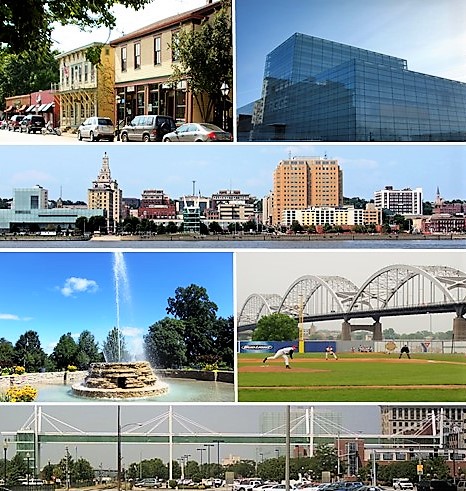
Moving to Davenport, Iowa: A Comprehensive Relocation Guide
Considering moving to Davenport, Iowa? This historic Quad Cities anchor offers riverfront beauty, diverse economy, and affordable living. With approximately 102,000 residents in 2025 (Quad Cities metro 382,000+), Davenport combines Mississippi River location with cultural amenities and the Iowa Quad Cities’ largest city.
Demographic Profile to Consider If Moving to Davenport:
Davenport’s 2025 population is approximately 102,000 residents, making it Iowa’s third-largest city, as part of the Quad Cities (Davenport, Bettendorf IA; Moline, Rock Island IL). The median age is around 37 years, with working families, diverse residents, and retirees. The population is approximately 80% White, 10% Black or African American, 6% Hispanic, 3% Asian. Davenport features beautiful Mississippi River location with parks and trails, historic downtown, diverse neighborhoods from affluent to working-class, and serves as the Quad Cities’ Iowa anchor. The city attracts diverse families, working-class to middle-class residents, and those seeking Quad Cities affordability with Iowa benefits. Davenport appeals to those prioritizing riverfront access, diversity, and value. The community balances manufacturing heritage with cultural offerings and maintaining riverfront beauty. Find trusted local services for moving, living, and working in Davenport.Davenport Relocation Directory
Cost of Living to Consider If Moving to Davenport:
Davenport offers exceptional affordability for a city its size. Median home values range from $140,000 to $210,000 in 2025, significantly lower than comparable metros while providing Mississippi River access and Quad Cities amenities. The median household income is approximately $56,000. Rental properties average $800 to $1,200 monthly. Iowa has no state income tax on retirement income; individual income tax is progressive 0.33%-8.53% (lower than Illinois’ flat 4.95%). Property taxes are moderate. Overall cost of living is very low for the riverfront location and amenities, making Davenport highly attractive for working families, retirees, and those seeking Quad Cities affordability with Iowa’s tax advantages. The city provides tremendous value with Mississippi River beauty. Housing costs create exceptional accessibility including riverfront properties at reasonable prices.
Economy and Job Market:
Davenport’s economy includes healthcare, manufacturing, education, and retail. Major employers include Genesis Health System (regional medical center and largest employer), St. Ambrose University, Palmer College of Chiropractic, Rock Island Arsenal (across river), John Deere facilities, and various manufacturers. Healthcare dominates employment. The broader Quad Cities economy offers opportunities. Typical commute times within the metro are reasonable. The diverse economy provides stability. Many residents work in healthcare, manufacturing, education, and services throughout the Quad Cities.
Education:
Davenport Community School District serves city students with multiple high schools including Central, West, and North. School quality varies significantly requiring extensive family research with some schools excellent and others struggling. St. Ambrose University and Palmer College of Chiropractic provide higher education creating some college atmosphere. The educational infrastructure serves the large, diverse population with quality varying dramatically by school and neighborhood.
Recreation and Lifestyle:
Davenport offers spectacular Mississippi River location with extensive riverfront parks, trails, and LeClaire Park. The city features Figge Art Museum (excellent regional art museum), River Music Experience, Adler Theatre presenting performances, and Putnam Museum. Residents enjoy the Freight House Farmers Market, TaxSlayer Center arena (shared with Moline), Quad City River Bandits minor league baseball, and riverfront festivals. Credit Union 1 Amphitheatre hosts major concerts. The lifestyle emphasizes riverfront recreation, diverse culture, affordable family living, and Quad Cities metro amenities. The four-season climate enables varied activities. The community values Mississippi River heritage, diversity, arts culture, and affordability. Living in Davenport means accepting working-class character, significant variation in neighborhood quality requiring research, some urban challenges, and Iowa’s third-city status while enjoying exceptional affordability, Mississippi River beauty with extensive riverfront access, Figge Art Museum, and Iowa’s tax advantages creating the Quad Cities’ most affordable large city where riverfront meets diversity.
Healthcare and Services:
Davenport residents access comprehensive healthcare through Genesis Medical Center (Davenport campuses), UnityPoint Health facilities, and extensive medical resources. The city serves as a regional healthcare hub with quality medical care and medical education.
Transportation:
Davenport is accessed via Interstate 74, Interstate 80, U.S. Route 61, and various corridors along the Mississippi. Quad City International Airport is in Moline. MetroLINK operates bus service throughout the Quad Cities. Most residents use personal vehicles. Typical commute times within the Quad Cities are 15-30 minutes.
Conclusion:
Moving to Davenport in 2025 offers affordable Quad Cities living with Mississippi River beauty, diverse community, and Iowa benefits. The city’s combination of exceptionally low housing costs, riverfront access, and healthcare employment makes it ideal for working families, healthcare professionals, and those seeking the Quad Cities’ largest Iowa city where Mississippi River meets exceptional affordability and diversity defines Iowa’s third-largest city.

